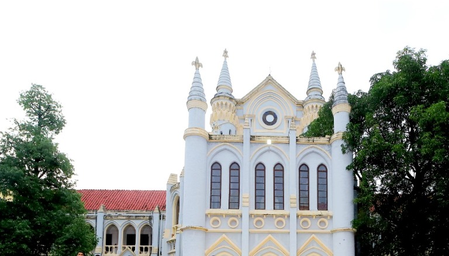

Jabalpur, Oct 24 (IANS) A group of 27 aggrieved educators has petitioned the High Court of Madhya Pradesh at Jabalpur, challenging the mandatory implementation of the ‘Hamare Shikshak (Our Teacher)’ app for electronic attendance marking.
The case, filed by Jabalpur resident Mukesh Singh Barkade and his colleagues from various districts, has thrust the contentious e-attendance policy into the judicial spotlight, highlighting deep-seated grievances over technology’s intrusion into the profession of teaching.
The Madhya Pradesh High Court has demanded a reply from the government. The next date of hearing is October 30, with the bench issuing a directive for the state government to furnish a detailed response by that date.
Advocate Anshuman Singh, representing the petitioners, argued before the court that the app’s rollout has engendered a cascade of practical hardships, transforming routine duties into bureaucratic ordeals. This is not merely an administrative tool; it undermines the trust inherent in the profession, Singh contended.
At the heart of the dispute lies the School Education Department’s decree, effective from July 1, mandating all government schoolteachers — numbering over 3.5 lakh across the state — to log their attendance via the app.
Upon arriving at school, educators must capture a “live selfie” with students, upload it for GPS verification, and repeat the process at dismissal. Non-compliance invites salary deductions, a penalty that has already ensnared thousands.
According to teachers’ association office-bearers in Vidisha district alone, a staggering 1,723 out of 2,190 guest teachers (79 per cent) have faced pay cuts for failing to comply, sparking outrage and fears of financial destitution among low-wage contract staff.
Similar scenes have unfolded in Anuppur, where zero compliance was recorded in initial audits, prompting stern warnings from the Directorate of Public Instruction (DPI).
The backlash has been volcanic. Teacher unions, including the Provincial Teachers’ Union and guest educator federations, decry the system as “inhuman and impractical”, a sentiment echoed in rallies across Umaria, Chhindwara, and Indore.
In Damoh, irate faculty submitted memoranda to Collector Sudhir Kumar Kochar, vowing street protests unless the order for salary slashes is rescinded. Balaghat witnessed a mass strike by thousands of guest teachers, who decried the absence of basic infrastructure. “Rural schools lack network coverage, and many of us can’t afford smartphones or data packs,” lamented one demonstrator.
Privacy concerns loom large, too, with the app allegedly exposing personal details publicly, breaching constitutional rights to dignity and data protection. A female teacher refused to go for e-attendance. When she was slapped with a notice by the department superiors, she replied, citing breach of privacy as the mobile phone was not provided by the government but was her personal asset, and she cannot give access to a third-party app.
A decade ago, in 2014, the High Court dismissed a similar plea against phone-based e-attendance, deeming it a progressive reform for accountability. Yet, the current iteration — bolstered by the ‘Hamare Shikshak’ platform launched in June — has amplified woes.
Teachers argue it erodes professional autonomy, treating educators as “machines” rather than mentors.
“We build futures, not just fill registers. This surveillance culture wounds the soul of teaching,” articulated a union leader from Gwalior, where over 22,000 educators grapple with the mandate.
The government’s rationale is unequivocal: curbing absenteeism and enhancing punctuality in a sector plagued by irregularities.
Director of Public Instructions (DPI) officials cite pilot successes in urban pockets, insisting the app fosters transparency. However, critics counter that without addressing rural digital divides — where 40 per cent of schools remain offline — the policy is a recipe for inequity.
Guest teachers, often on meagre honorariums of Rs 8,000-12,000 monthly, bear the brunt, with unions threatening province-wide agitation if the High Court does not intervene.
–IANS
sktr/dpb
